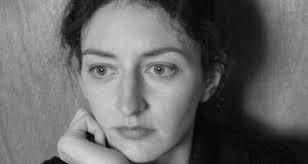Poet
Caitríona O’Reilly

Caitríona O’Reilly
(Ireland, 1973)
© Irish Times
Biography
Caitríona O’Reilly, born and educated in Dublin, and now living in Britain, is a poet whose imagination ranges across historical and national boundaries. An attentive reader of landscapes and texts, her own work repays careful scrutiny in its subtle and responsive use of observation and metaphor, and in its concern with the relationship between language and materiality. From her earliest poems distinct forms have been assailed by natural phenomena, by weather and tides, as well as by incursions from the world of dream and imagination. The mutability of self and world is foremost, and the contingent relationship between the two continues to shape her work. O’Reilly was born in Wicklow and educated at Trinity College, Dublin, where she completed a Ph.D. in American Literature. She has published three full collections of poetry with Bloodaxe Books. The Nowhere Birds (2001) was shortlisted for the Forward Prize for Best First Collection and was awarded the Rooney Prize in Irish Literature; The Sea Cabinet (2006), a Poetry Book Society Recommendation, was shortlisted for the Irish Times Poetry Now Award. Geis (2015) was a Poetry Book Society Recommendation and is jointly published by Bloodaxe Books and Wake Forest University Press in the United States. It was shortlisted for the 2016 Pigott Prize and was the winner of the 2016 Irish Times Poetry Now Prize. Caitríona O’Reilly also writes literary criticism and has published some short fiction. She lives in Lincolnshire, U.K.
In this poem the self is understood through its actual and metaphorical links with the physical world. The surface of the body is compared both to natural and created forms, and rupturing it reveals an interior that is at once integral to, and distinct from, the whole being. Earlier poems also contemplate the contained body as a figure of division – the "chill and dark” of the small room in ‘Thin’ yields a fragile figure poised in an act of self-destruction, at once supported and consumed by the fixed form of the sestina. Geis, from the title sequence of O’Reilly’s 2015 volume, again links distress to enclosure, both through the imagery of hospitalisation and the encircling power of the disturbed mind itself. Once more the integrity of the body is breached to purify the wounded self.
Beyond these representations of containment, though, lie the more expansive spaces of seascape and horizon. The remarkable stillness often found in O’Reilly’s work is understood differently in the context of these impenetrable vistas; in ‘Six Landscapes’ from The Sea Cabinet (2006) we are drawn towards the edges of experience and perception, to spaces that mediate between different elements – earth, water, air – and thus expose the fundamental instability of all life forms: “It is land for the grasshopper/and lark, then suddenly air/and the sea’s sharp glance” (‘Bempton Cliffs’).
In the midst of this concern with the physical world there is continued attention to language and thought, often signalled through sustained engagement with perception itself. Ovum takes generative matter, the very means by which humans are perpetuated, and traces a journey in language that reflects the complex interplay of word and substance:
Unless you seal the gap it’s left, they fall
out, those other o-words, like bubbles
streaming through a soapy blow-hole:
from oblation and obloquy to oxlip and ozone...
The process of signification – the way in which words and objects may be emptied of meaning, or accumulate new connotations – is raised here, picking up a longstanding concern with the particularity of naming and describing in this body of work.
It is for this reason that visual representation becomes particularly central to O’Reilly’s poetic method: as well as being minutely observant of the natural world, she is also an absorbed reader of poetry, history and lexicography. This incorporation of textual and material detail from the past emphasises the close connections between intellectual and experiential modes, and attends to the overlapping patterns of nature and culture, increasingly prominent in her work.
The Glass Sponge begins with the stained glass window, an image expressive of the layered and segmented character of these texts. The poem then turns to the sponge itself, naturally formed of glass fibres, yet giving the impression of artificiality. As well as supporting the life of the ocean, it illuminates its depths – just as elsewhere in O’Reilly’s oeuvre, light is suggestive both of self-scrutiny and reflection: “the light –/ it fills my eye-vessels/to overflowing, shifting/the rods and cones/of their ravenous geometry” (‘Diffraction’). Light also plays a role in Gall, intensifying the black ink used for writing, and featuring in the process of reproduction, both human and textual. This bitter natural substance can yield soothing language, but the reverse is also true – biblical fruit is not generative here but deathly, just as the written text fades and disintegrates in time.
This undoing of created meaning is itself a form of revelation and contributes to the understanding of the mutable human subject with which O’Reilly is so often concerned. Testing the boundaries between nature and art places knowledge of the world and of the self at the centre of her poetic enquiry.
© Lucy Collins
BOOKSThe Nowhere Birds Northumberland: Bloodaxe Books, 2001.
The Sea Cabinet Northumberland: Bloodaxe Books, 2006.
Geis Northumberland: Bloodaxe Books, 2015.
Poems
Poems of Caitríona O’Reilly
Sponsors
























